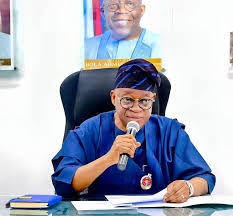
Nigeria has charted a historic course toward sustainable development and ocean-based economic growth with the Federal Executive Council’s (FEC) approval of the country’s first-ever National Marine and Blue Economy Policy.
The policy, approved on Monday, May 5, is expected to unlock the nation’s vast coastal and aquatic resources and establish a blueprint for long-term prosperity.
Honourable Minister of Marine and Blue Economy, Adegboyega Oyetola, described the approval as a “defining moment” and a strategic move that aligns environmental stewardship with inclusive economic expansion. Speaking shortly after the announcement, the Minister emphasized that the policy will serve as a comprehensive guide for the development of the marine and blue economy sector over the next decade.
“This is not just a policy document — it is a bold declaration of intent,” Oyetola said. “It provides clear pathways for leveraging our marine resources for national development, while also protecting the environment.”
The Minister noted that Nigeria’s coastal assets — including 853 kilometers of coastline and a vast network of inland waterways — have remained underutilized for decades. With the newly approved policy, Nigeria now has a framework that covers areas such as maritime trade, aquaculture, blue tourism, ocean energy, and environmental conservation.
Developed through inclusive and multi-stakeholder consultations, the policy integrates expert insights, community perspectives, and sector-specific priorities. Oyetola said the process adds credibility and ensures that the policy is both practical and adaptable to changing global and domestic dynamics.
“It is the outcome of patient dialogue and consensus-building, not a top-down imposition,” he stressed.
The policy includes an embedded monitoring and evaluation framework, which will guide its implementation and ensure accountability across the public and private sectors. Oyetola assured that the Federal Ministry of Marine and Blue Economy is fully prepared to lead with “diligence and transparency.”
Highlighting the pivotal role of private investment, Oyetola called on both domestic and international investors to partner in driving innovation and infrastructure development in the sector. He also emphasized the importance of public-private partnerships (PPPs) in mobilizing the expertise and capital necessary to realize the policy’s full potential.
“This is a moment for partnership,” he said. “The private sector has a critical role to play in transforming our blue economy from concept to reality.”
The policy, Oyetola added, aligns with President Bola Ahmed Tinubu’s Renewed Hope Agenda, which prioritizes economic revitalization, social inclusion, and climate resilience. He expressed confidence that the implementation of the policy will lead to measurable improvements in livelihoods, national revenue, and ecological health.
“It’s time to turn the tide,” the Minister declared. “The ocean is not just a boundary — it is our future. And with this policy, we are ready to navigate that future with clarity, purpose, and unity.”
The approval of the National Marine and Blue Economy Policy positions Nigeria as a forward-thinking nation embracing the global shift toward sustainable ocean economies. It also reaffirms the government’s commitment to transforming the marine sector into a key driver of economic diversification and long-term growth.















